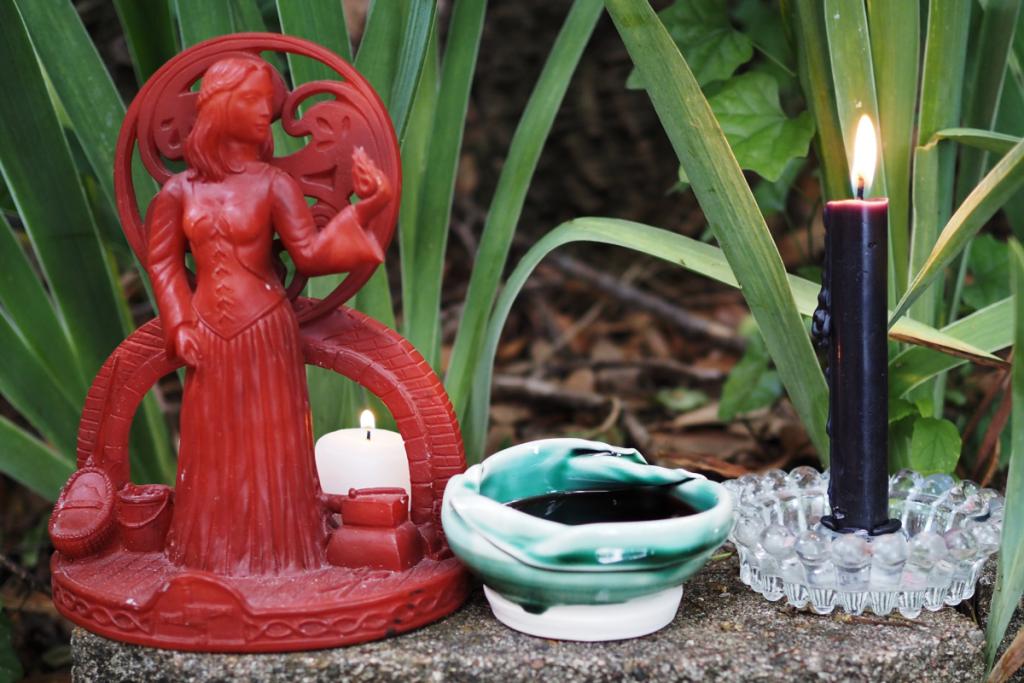Whether we are Pagans, Christians, atheists, or anything else, we all live, breathe, and practice in the same religious environment. And that religious environment is shifting yet again.
The new environment
The latest shift was announced by the nonpartisan Pew Research Center back in February, when they concluded that the Decline of Christianity in the U.S. Has Slowed, May Have Leveled Off based on their 2023-24 study.
As I’ve discussed before, most of the people leaving Christianity didn’t become atheists. They became “none of the above” or “spiritual but not religious.” The long-awaited withering away of religion hasn’t happened. Instead, what it means to be religious has shifted.
But now it seems that people – or at least, some people – are starting to move back toward traditional religion.
Writing for Vox, Christian Paz asks Gen Z is finding religion. Why? His essay has more questions than answers, but it’s useful if only because it calls attention to a trend: for whatever reasons, Gen Z are more religious than Millennials.
This piece by Erica Pandey of Axios presents this info in bullet form, pointing out that the trend isn’t just in the U.S., and speculating that it may be tied to the shift of many young men to the political right.
The essay most useful to us as Pagans comes from Lauren Jackson of The New York Times. Last month she wrote Americans Haven’t Found a Satisfying Alternative to Religion, subtitled “Is it any wonder the country is revisiting faith?” Jackson left the Mormonism of her family and childhood because she couldn’t support its socially conservative teachings. But now:
My spiritual longing persists — and it hasn’t been sated by secularism. I want a god … I still remember the bliss of finding the sublime in the mundane. I still want it all to be true: miracles, souls, some sort of cosmic alchemy that makes sense of the chaos.
This religious resurgence presents an opportunity for Pagans and Paganism.
We didn’t become Pagans because it was trendy
Let’s start with what I hope is obvious: we believe and do what we believe and do because it makes sense for us. Chasing trends leads to things like rock bands in fundamentalist churches – it doesn’t really fit, and while it may attract the curious it doesn’t build deep commitments.
We are Pagans because this path calls to us. We need to continue to follow the call of the Gods and the yearnings of our souls, whether it’s trendy or not, whether it’s popular or not, whether it’s politically expedient or not.
At the same time, there are things we can do to let people who are searching know that they have more options than Catholicism, Evangelicalism, or Mainline Protestantism. This is an opportunity to grow the Pagan movement with people who would be here if they knew about us.
Embrace the Gods
Lauren Jackson of The New York Times wants a God. We have plenty to choose from… or to hear from.
The West has been told “there is only one God” for so long some people get angry when you tell them there are many Gods. But the experiences of most people throughout most of the world throughout most of history – including some of us here and now, including me – point to many Gods, not just one.
Our Gods do not demand unquestioned obedience. Rather, they tell us to learn and grow and take responsibility for our lives. They do not give us a long list of rules to follow. Rather, they present their value and virtues, and encourage us to embody them in our lives – especially when making difficult decisions. They do not promise to fix everything for us – a false promise no matter who makes it. Rather, they promise to be with us as we make our way through the challenges of life.
I know that some in the Big Tent of Paganism don’t believe in the existence of Gods. Others believe they’re real but don’t want to deal with them. That’s fine. But for many Pagans, and definitely for me, they form the foundation of our practice.
Let’s embrace the Gods.
Embrace Nature
Finding the Divine in Nature is easy. Much of this is the “sublime in the mundane” that Lauren Jackson wrote about: sunrises and sunsets, mountains and rivers, full moons.
Whether we were all created by one God is a question for debate (obviously I’m in the “no” camp), but that we are all the children of the Earth is a scientific fact. Life on Earth evolved once and every living thing is the descendant of that first simple organism. When Saint Francis called the wolf his brother he was speaking truth in a way he could not know intellectually even though he understood it spiritually.
We are dependent on the Earth and the Sun for our survival. Storms and wolves (and viruses) remind us that humans are one part of Nature, not its head and not its center.
Go outside some clear dark night and look up. With your eyes you can see stars and galaxies as far as two million light years away. Using a space telescope you can see objects even further away – when the light you see left those galaxies, the Earth didn’t even exist.
Nature is so very old and so very large. We are so very new and so very small, and our lifetimes are so very brief. And yet, here we are, a part of it all, contemplating it all.
It’s easy to embrace Nature. Let’s do it.
Embrace magic
If someone tells you they don’t believe in magic, ask them for a lock of their hair and see how they react.
No, we can’t do what fictional witches do. But we can move the odds in our favor. I’m not a fan of Aleister Crowley, but he had what is still the best definition of magic: “the science and art of creating change in conformity with will.”
Sometimes magic works by the intercession of Gods and other spirits. Both believers and skeptics can point to studies on the efficacy of prayer that support their views, but I’ve seen enough first-hand results over the years to convince me.
Sometimes magic works by psychological programming. We communicate with our subconscious through symbols and we power our desire with chanting, dancing, singing, or other actions. And then we start behaving differently and start putting ourselves in places where good things can come to us. And they do.
And sometimes magic works by the manipulation of unseen forces. Some call this “energy” and while that’s not entirely accurate (energy has a precise scientific definition), it works in a way not unlike electromagnetic energy. It can be transformed and manipulated and used to achieve a goal.
Most people want to live in an enchanted world, but few realize they already do. Every generation looks to the past as a Golden Age, while at the same time having the kind of magical and mystical experiences that will be seen as the Golden Age by future generations.
Some of us understand that we’re living in a Golden Age of magic right now. Let’s embrace it.
Embrace community
For most of us, this is the hard one. We got hurt in a religious organization and we’re leery of trying again. We want to do Paganism our way and we don’t want anyone telling us what we can and can’t do. The ordinary world places tremendous demands on our time and we don’t have much left over for regular group activities.
And still, one of the biggest problems in our contemporary society is loneliness. Several journalists mentioned that as one of the main drivers behind the resurgence of religion.
Humans are social animals. We need community. If you can find that in a yoga class or tennis league, great. But yoga classes and tennis leagues rarely create the kind of deep connections that come through shared religion and spirituality.
Community doesn’t have to look like a church! I’m a UU and my primary practice is with a CUUPS group – I’m OK with things that look like a church. But I’m also OK with other models.
For many of us, the coven model works best: 13 or fewer (usually fewer) people who gather to practice together on the Wheel of the Year or at the full moons. If you don’t like the term “coven” call it a grove or a circle or a murder (of crows, that is).
Community scales up too. It’s great going to things like Pagan Pride Day or Witches Night Out, and especially to the large festivals and conventions (I’ll be at Mystic South in Atlanta in July – it’s going to be great).
Attendance at Denton CUUPS rituals is growing again. Especially at times like these, we need community. Let’s embrace it.
Embrace excellence
I went to a lot of churches when I was a Christian and now that I’m a UU. I go to a lot of circles as a Pagan.
Some of those experiences were really good. Most were OK. Some were bad. A few were really bad. Sometimes they were bad because they were being run by bad people, but most of the time they were bad because people hadn’t put the work in up front to plan and facilitate a good service or ritual.
While I agree that anything worth doing is worth doing badly (better to do it badly than not at all), the people who come to our events – whether large public celebrations, medium sized group rituals, or small intimate workings – are looking for something good. Something powerful. Something that says “I’m not sure what I just experienced, but I am sure it was real.”
Spiritual excellence begins with regular spiritual practice – the prayers, offerings, and other activities you do every day, every week, every season. It continues with diligence – doing the right things over and over again. The rituals I write and lead now are significantly better than the ones I did when I was first starting out, because now I have years of experience doing them. And reviewing them to see what went well, and what didn’t.
While you’re trying to build that experience, remember that a little hospitality goes a long way.
Let’s embrace excellence in our personal practices and especially in our public events.
The religious environment is changing – again
I’ve been blogging for 17 years, and in that time the religious environment has changed several times. Sometimes we in the Pagan community have responded well to these changes, while other times we’ve done our best to ignore them.
Modern Paganism facilitates experiences of wonder and awe, mystery and magic. It helps us build respectful, reciprocal relationships with our Gods and ancestors, with Nature, and with each other. It’s a spiritual home for those of us who cannot honestly believe what the bigger religions tell us we must believe.
It provides a foundation and guidelines for spiritual practice, while respecting the right – and the necessity – of each person to determine their path for themselves.
Let’s embrace our Paganism, and be ready to welcome those who are looking for what we have.

















